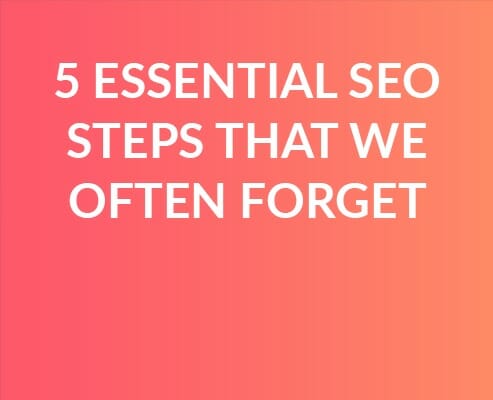Writing a good article takes more than just piecing together a page-full of beautifully crafted sentences. You also need a relationship between quality copy and basic SEO – which we talk about in more detail in our blog post here.
Copywriting experts are generally familiar with the basics of SEO. But when you’ve been producing content for so long, it’s easy for them to completely slip your mind.
Whether you’re a seasoned content creator or a business looking to understand what makes an article get seen, it’s time to delve into the 5 essential SEO steps that we shouldn’t forget, but often do:
The Meta Description
It’s far too easy to be ultra-lazy with your meta description – and that’s if you choose to fill it in at all.
Perhaps you think that meta descriptions are losing relevance, because search engine sites have a habit of randomly placing a segment of your text in the description’s place when someone makes a related search. You shouldn’t think about that, because you still want to make sure your meta description is at its best when it is being seen.
Don’t forget about your keywords when writing your description. This is especially useful if you can’t fit a particular keyword in the title tag.
Keyword Research… Even When You Think You Know It All
When you’ve been operating a business for so long, you might have led yourself to believe that you’re basically an expert in the search terms your audience uses. But this may not be the case.
You need to stop and reconsider: are you thinking about what your audience wants, or what your audience expects from you? The two are very different in meaning.
Perform surveys. Ask your friends. Use free keyword research tools. Make your own searches on popular search engines. Do your keyword research regularly, and see what you can learn from it.
Readability
We’ve all heard the doom-and-gloom proclamations that as our attention spans continue to shorten, the average reader can’t even make it through a single online article anymore.
This is only true in some senses. If a user is visiting your site for a specific purpose, such as to learn something, they’ll stick around for much longer. But only if your content is readable.
We’re not suggesting that content needs to be dumbed down to attract the widest readership possible. In fact, your own particular readership might find dumbed down content offensive. It’s all about writing in a language that can be understood and appreciated by your own audience.
Inbound and Outbound Links
When you produce an article, you can be so focused on your own words that it’s easy to forget the value of other people’s. Linking to good quality external sources, as well as your own relevant internal posts, will massively improve your SEO ranking.
Outbound links are essential for sending your readers to other authoritative sources on the internet. While this may seem like a bad thing – hey, you want your audience to stay on your own site – it’ll help your website to become connected to a web of other pages online that are valued by search engines.
Your inbound links offer less contribution to SEO, but they’ll encourage your readers to check out similar content, which helps you keep people on your site for longer. The longer someone stays on your site, the bigger impression you’ll make on them.
Fast Loading Website
This is a bit of a bonus point, because you’ll never be able to improve your loading speeds by making tweaks to your written copy. But loading times truly matter – because nobody’s going to wait around for a website that doesn’t load fast enough. Which means no-one will read your work.
Search engines take into account how long a visitor spends on your page, so if you can encourage your audience to read your full post rather than clicking away when your page doesn’t load, you’re onto an SEO winner.





